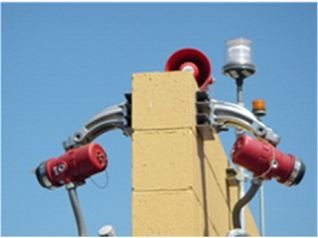Hydrogen Properties & Leak Detection Considerations
See So You Want to Know More About Hydrogen for a better understanding of the properties of hydrogen. Hydrogen Compared with Other Fuels may be the most helpful source for designers.
An understanding of the properties of hydrogen is critical for the proper design of a facility or workspace. A workspace can be configured to mitigate hazards by understanding and taking advantage of some of the characteristics of hydrogen.
Hydrogen is colorless and odorless, so human senses can't detect it. Personnel should use caution when approaching an area where there is the potential for a hydrogen leak. Best practices include the following:
- Listen for the sound of high-pressure gas escaping.
- Gas detectors should be permanently installed indoors where leaks may occur or where hydrogen may accumulate.
- Listen and watch for alarms.
- Use a portable hydrogen detector.
Flame Detection System
(Photo courtesy of HAMMER)
References
CGA G-5, Hydrogen
CGA H-4 Terminology Associated with Hydrogen Fuel Technologies
B. Lewis and G. von Elbe, Combustion, Flames and Explosions of Gases, 3rd ed., Academic Press, Orlando, 1987, pg. 717.
Babrauskas, Vytenis. "Ignition Handbook" Fire Science Publishers, Issaquah, WA.
J. Hord, Is Hydrogen Safe? National Bureau of Standards (NBS) Technical Note 690, October 1976.
F.J. Edeskuty and W.F. Stewart, Safety in the Handling of Cryogenic Fluids, Plenum Press, New York, 1996, pg. 102.


